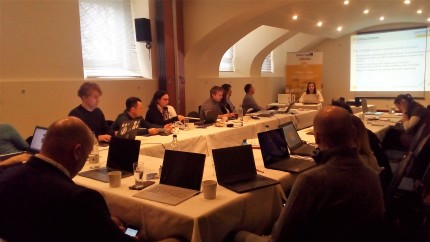SZOMBATHELY WELCOMED URBAN INNO TEAM
The 3rd Urban Inno PSC meeting, held in the Hungarian city of Szombathely on the 30th and 31st of January, was opened by Tina Ragužin (LP City of Rijeka) with WP Management topics and financial state overview, followed by the Communication report for the last project period. The first printed material for project promotion – flyer, was also presented. After joint discussion, a study visit to ELTE Gothard Astrophysical Observatory was arranged, within which all of 25 attendants had the opportunity to learn more about their host’s mission and activities. Also, a guided tour was provided through the permanent exhibition where interesting equipment and museum pieces were observed by Urban Inno team members. First day of the meeting ended in the restaurant Határmenti Vigadó, where guests enjoyed local Hungarian cuisine, along with traditional music and dance.
Luc Schmerber (PP inno AG) opened the second PSC day with WP T1: Setting-up quadruple-helix urban innovation (4UI) clusters/networks in target regions, with Regional mapping of key stakeholders was particularly clarified, as basis for core team setup. Furthermore, the list of upcoming activities was provided, indicating very dynamic project period to come.
Anja Prislan (PP E-zavod), for WP T2: Development of toolbox of smart participatory methods, presented projects that included most appropriate and proven participatory methods (UPSIDE, CentraLab, e-Consultations, IoPartecipo, Q Neighbours Movement and OCOPOMO) which can support the 4UI process. Each of the selected methods was particularly presented by the responsible project partner (CyberForum, E-zavod, City of Rijeka, Informatica Trentina, Kielce Technology Park and University of Košice), providing basics for the toolbox, which will be used in urban innovation processes (pilots).
As for WP T3: Implementing and evaluating (Smart) participatory methods in urban innovation processes (pilots), Marco Combetto (PP Informatica Trentina) reported on current activities in time framework, and provided further guidelines for improvement of required deliverables – Pilot Design, Pilot Roadmaps and Letters of Support from Civil Society. The session ended with pitch-presentations of all 9 pilots related to different thematic fields: Fachhochschule Voralberg on Mobility, CyberForum and Forschung Burgenland on Energy, Informatica Trentina and City of Maribor/E-zavod on Innovative Government, City of Rijeka/Ericsson Nikola Tesla on Integrated Public Infrastructure, University of Košice on Agriculture/Urban Food System, Kielce Technology Park on Agriculture/SME Growth, and Pannon Bussines Network Association on SME Growth.
The next, 4th PSC meeting of Urban Inno project will be held in Karlsruhe, in April 2017.
